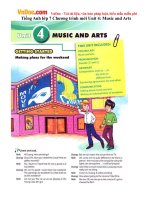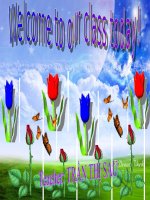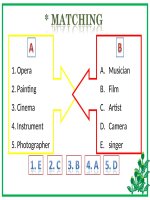Unit 04. Music and Arts. Lesson 5. Skills 1
Bạn đang xem bản rút gọn của tài liệu. Xem và tải ngay bản đầy đủ của tài liệu tại đây (1.5 MB, 25 trang )
Matching
1
a) countryside
4
b) wood
2
c) puppet
d) pool
3
e) rice farming
5
Period 30 / Week 10
Unit 4 (cont)
MUSIC AND ARTS
SKILLS 1
Vocabulary:
- water puppetry (n): múa rối nước
- strings (n):
những sợi dây
- emotional (a): dễ xúc động
- melodic (a): du dương
- puppeteer (n) người điều khiển con rối
- control (v):
điều khiển
Period 30 / Week 10
Unit 4 (cont)
MUSIC AND ARTS
SKILLS 1
Reading
Discussion
What kinds of traditional Vietnamese performance do you know about?
Do you know about water puppetry?
Have you been to a water puppet show?
Do you like water puppet show? Why?
Period 30 / Week 10
Unit 4 (cont)
MUSIC AND ARTS
SKILLS 1
Reading
1. Find the words in the text which mean:
Have you ever seen a water puppet show? It is so special
and fantastic. It’s a unique Vietnamese tradition. Children
love the performance, and tourists who come to Viet Nam
greatly enjoy this kind of art.
Water puppetry is a traditional art form. It began in the
11th century. It originated in the villages of the Red River
Delta of north Viet Nam. The show is performed in a pool.
The puppets are supported by strings under the water and
controlled by the puppeteers behind a screen, so they
appear to be moving on the water. The puppets are made
of wood and then painted.
The themes of the puppet shows are rural: the
performances show everyday life in the countryside and
folk tales. There are stories about rice farming, fishing and
Vietnamses village festivals.
1. special or different
= unique
2. started
= began
3. showed or presented
= performed
4. from the countyside
= rural
5. Events or celebrations
= festivals
Period 30 / Week 10
Unit 4 (cont)
MUSIC AND ARTS
SKILLS 1
Reading
2. Answer the following questions:
1. When did the water puppetry begin?
It began in the 11th century.
2. Where does a water puppet show take place?
It takes place in a pool.
3. Who are the puppets controlled by?
They are controlled by puppeteers.
4. What are the puppets made of?
They are made of wood.
5. What are water puppet shows normally about?
They are about everyday life in the countryside and about
folk tales.
Lucky numbers
2
1
5
3
6
4
7
Group 1
10
10
10
10
Group 2
10
10
10
10
10
10
1. When did water puppetry begin?
It began in the 11th century.
2. Where does a water puppet show take place?
It takes place in a pool.
3. Who are the puppets controlled by?
They are controlled by puppeteers.
4. What are the puppets made off?
They are made of wood.
5. What are water puppet shows normally about?
They are about everyday life in the countryside
and about folk tales.
MUSIC AND ARTS
Period 30 / Week 10
Unit 4 (cont)
SKILLS 1
Speaking
3. Match the types of music in A with the adjectives to describe them in B:
A
Answer
B
1. pop music
1–e
a. old, emotional
2. folk music
2- a
3–b
4–c
5–d
b. lively, exciting
3. rock and roll
4. hip – hop / rap
5. blues
c. quick
d. sad, melodic
e. popular, pleasant
4. Game: TIC TAC TOE
G2
G1
G1
G2
G1
4
0
X
G2
G1
G2
X
G1
G2
0
7
0
X
G1
G2
6
X
0
X
G2
G1
G2
8
X
0
5
G1
G2
3
X
0
0
G1
2
1
0
GROUP 2: X
GROUP 1: O
X
0
9
X
Give the names of two Vietnamses
musical instruments.
Sing a song in English
Who is your favourite singer?
Why?
Talk for 30 seconds about what
you see when you visit an art
gallery
How often do you go to a concert?
Tell your partner about the last
concert you went to
Who is your favourite
Vietnamese musician? Why?
Talk for 30 seconds about your
favourite instrument.
Name one of your favourite painters.
Who can draw best in your class?
What does he / she often draw?
Homework
- Read the passage and answer the questions again.
- Learn the vocabulary by heart.
- Prepare “skills 2”









